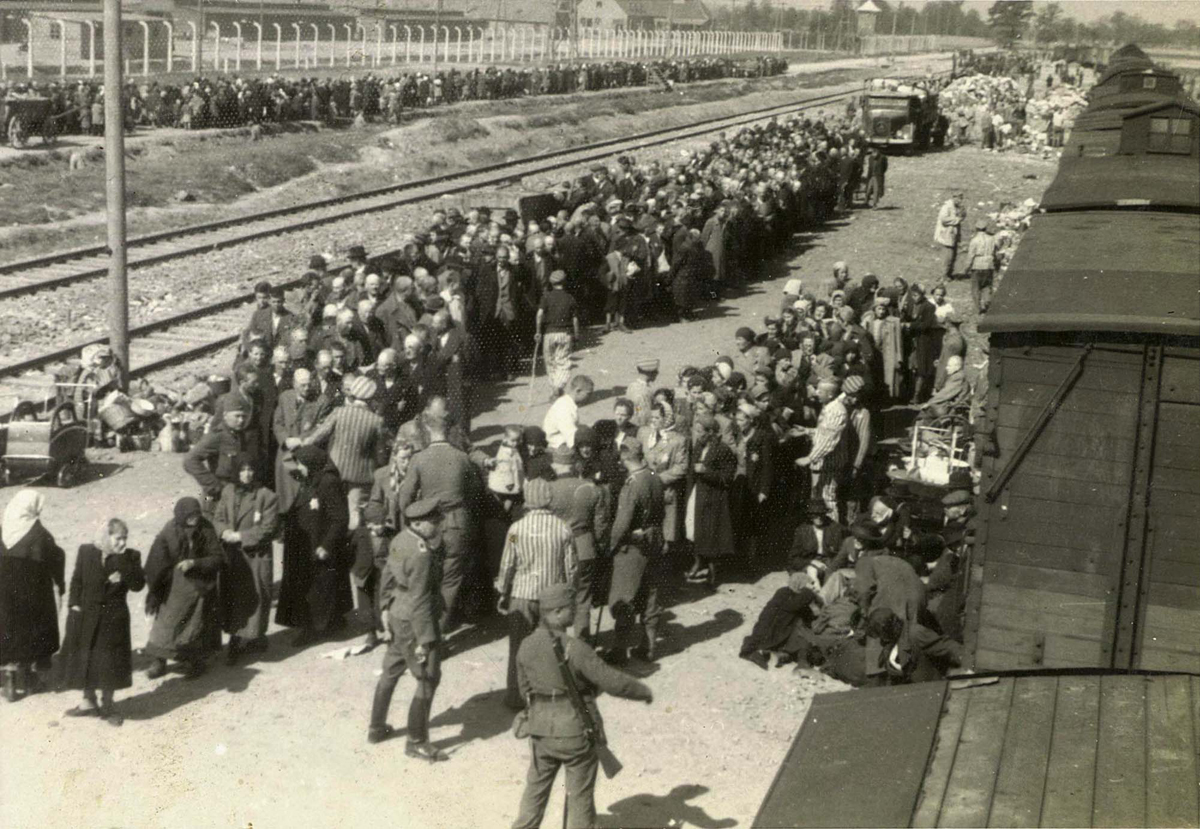Selection (Nazi Concentration Camps) on:
[Wikipedia]
[Google]
[Amazon]
 Selection (
Selection ( The SS guards at the camps likely did not use the term , but instead would have referred to () and ().
The SS guards at the camps likely did not use the term , but instead would have referred to () and ().
 Selection (
Selection (German
German(s) may refer to:
* Germany (of or related to)
**Germania (historical use)
* Germans, citizens of Germany, people of German ancestry, or native speakers of the German language
** For citizens of Germany, see also German nationality law
**Ger ...
: ) was the process of designating inmates for either execution or forced labor at a Nazi concentration camp.
The arrival selection was first a separation by gender, and then a separation into either fit or unfit for work, as determined by a soldier or bureaucrat or doctor after a visual inspection or perhaps a question or two. Children under 16 and later 14, the elderly, women visibly pregnant, mothers who would not leave their children, the disabled, or anyone visibly weak or ill, were ineligible for "selection" and were simply sent to their deaths. In addition to the initial selection upon arrival, subsequent selections would occur at subsequent prisoner counts, the , or in the , the camp barracks. The selection officers were nominally looking for healthier, stronger laborers, but according to historian Jan Erik Schulte
Jan, JaN or JAN may refer to:
Acronyms
* Jackson, Mississippi (Amtrak station), US, Amtrak station code JAN
* Jackson-Evers International Airport, Mississippi, US, IATA code
* Jabhat al-Nusra (JaN), a Syrian militant group
* Japanese Article Numbe ...
, camp guards and administrators were given maximum discretion in selections, which resulted in "ultimately only a superficially utilitarian-motivated selection process."
The selection process was heavily dependent on the labor-force needs of the camp at that time. Approximately 1 in 5 of all transported prisoners survived selection and were thus enslaved. Selection was specific to the camps, such as Auschwitz or Majdanek
Majdanek (or Lublin) was a Nazi concentration and extermination camp built and operated by the SS on the outskirts of the city of Lublin during the German occupation of Poland in World War II. It had seven gas chambers, two wooden gallows, a ...
, that served some kind of industrial function for the regime. As one article put it, "Like Auschwitz-Birkenau, Majdanek was the rare concentration camp that was also a death camp. Forced labor from the camp was to man the shops and factories of an SS empire that would be centered in Lublin. This empire never materialized as SS chief Heinrich Himmler
Heinrich Luitpold Himmler (; 7 October 1900 – 23 May 1945) was of the (Protection Squadron; SS), and a leading member of the Nazi Party of Germany. Himmler was one of the most powerful men in Nazi Germany and a main architect of th ...
had fantasized, but some of its building blocks, including Majdanek, were put in place. The Germans established an elaborate hierarchy of power and order in the camp, which relied on violence from the camp commander down to the barracks elders for its functioning." The extermination camps
Nazi Germany used six extermination camps (german: Vernichtungslager), also called death camps (), or killing centers (), in Central Europe during World War II to systematically murder over 2.7 million peoplemostly Jewsin the Holocaust. The ...
, such as Belzec
Belzec (English: or , Polish: ) was a Nazi German extermination camp built by the SS for the purpose of implementing the secretive Operation Reinhard, the plan to murder all Polish Jews, a major part of the "Final Solution" which in total ...
, Chełmno
Chełmno (; older en, Culm; formerly ) is a town in northern Poland near the Vistula river with 18,915 inhabitants as of December 2021. It is the seat of the Chełmno County in the Kuyavian-Pomeranian Voivodeship.
Due to its regional importa ...
, Sobibor
Sobibor (, Polish: ) was an extermination camp built and operated by Nazi Germany as part of Operation Reinhard. It was located in the forest near the village of Żłobek Duży in the General Government region of German-occupied Poland.
As ...
and Treblinka
Treblinka () was an extermination camp, built and operated by Nazi Germany in Occupation of Poland (1939–1945), occupied Poland during World War II. It was in a forest north-east of Warsaw, south of the Treblinka, Masovian Voivodeship, vi ...
, had essentially no selection, only death by gas.
Selection began with , the killing of sick or weak prisoners who were considered a burden to the Reich. Action 14f13 was itself a derivative of , the extermination of the disabled and mentally ill, and all of it was derivative of eugenics
Eugenics ( ; ) is a fringe set of beliefs and practices that aim to improve the genetic quality of a human population. Historically, eugenicists have attempted to alter human gene pools by excluding people and groups judged to be inferior or ...
and the Nazi ideology of racial purity, Aryan superiority, sexual insecurity, etc. Dr. Mengele used selection to find twins for his experiments at Auschwitz, as recalled by Eva Mozes Kor
Eva Mozes Kor (January 31, 1934 – July 4, 2019) was a Romanian-born American survivor of the Holocaust. Along with her twin sister Miriam, Kor was subjected to human experimentation under the direction of SS Doctor Josef Mengele at the Ausch ...
.
 The SS guards at the camps likely did not use the term , but instead would have referred to () and ().
The SS guards at the camps likely did not use the term , but instead would have referred to () and ().
References
{{Nazi concentration camps Holocaust terminology